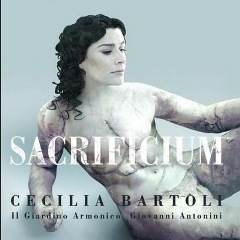Cecilia Bartoli – Sacrificium (2009)
Cecilia Bartoli – Sacrificium (2009)

01. Come nave in mezzo all’onde (Nicola Porpora) 02. Profezie, di me diceste (Antonio Caldara) 03. Cadrò, ma qual si mira (Francesco Araia) 04. Parto, ti lascio, o cara (Nicola Porpora) 05. Usignolo sventurato (Nicola Porpora) 06. Misero pargoletto (Carl Heinrich Graun) 07. In braccio a mille furie (Nicola Porpora) 08. Qual farfalla (Leonardo Leo) 09. Nobil onda (Nicola Porpora) 10. Deh, tu bel Dio d'amore…Ov`è il mio bene? (Carl Heinrich Graun) 11. Chi temea Giove regnante (Leonardo Vinci) 12. Quel buon pastor son io (Antonio Caldara) 13. Son qual nave [Arbace] from Act III of Artaserse (Pasticcio) 14. Ombra mai fu [Serse] from Act I of Serse 15. Sposa, non mi conosci [Epitide] from Act III of Merope
Cecilia Bartoli is such a veteran of the talking point album, and of unearthing forgotten repertoire, that it would be more of a talking point if she produced an unimaginative album of core repertoire. For Sacrificium, which features 11 world premiere recordings, she has teamed up with Il Giardino Armonico and Giovanni Antonini, with whom she recorded her Vivaldi album. Showcasing music written for castrati, it’s undoubtedly designed to make people take notice.
For a start, the history of castrato singing in Italy is enough to turn the most robust stomach; a castrato was a male adult soprano whose voice had been prevented from breaking normally during puberty by pre-pubescent castration. Appetite for the voice, fuelled by a ban on women singing in church, meant that by the 18th century as many as 4,000 boys were castrated in Italy alone. A sobering thought for any man.
However, music of exceptional beauty and passion was created for these male-strength soprano voices, and so the sleeve’s boast that these two discs feature 100 minutes of “some of the most virtuosic music ever written for the human voice” is not entirely without credibility. The cover image is just as striking, placing Bartoli’s head atop a classical marble male nude.
On to the music, and it’s a classic Bartoli offering – an almost painfully slickly produced product that nevertheless sees off critical cynicism with its dramatic, technical and vocal prowess. The album’s meat is undoubtedly on the first disc, featuring arias by Porpora, Caldara, Araia, Graun, Leothe and Vinci. Their virtuosity and range of emotion are as remarkable as Bartoli’s excitingly, flawlessly passionate delivery of them.
The second disc, actually only a 20-minute ‘bonus’ offering, gives baroque opera fans Bartoli’s take on three more familiar castrato arias: Broschi’s “Son qual nave” (Artaserse), Handel’s “Ombra mai fu” (Serse) and Giacomelli’s “Sposa, non mi conosci”. Whether these work for the listener will be down to personal preference for the male or female voice in this music but, like the rest, they confirm if it even needed confirming that Bartoli remains one of today’s greatest artists. ---Charlotte Gardner, BBC Review
Last Updated (Monday, 28 January 2013 22:49)








